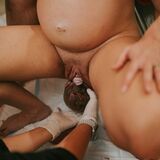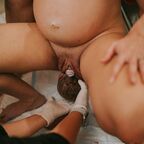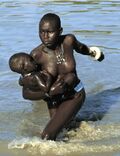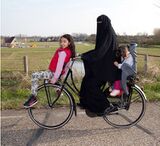Difference between revisions of "母"
(Created page with "<div style="float:right; margin:-78px -14px 0px 4px; background-color:white"> 160px </div> X6BCD 母 is Unicode charac...") |
|||
| Line 61: | Line 61: | ||
or Romanji [[Haha]] <br> |
or Romanji [[Haha]] <br> |
||
or Hiragana [[はは]] <br> |
or Hiragana [[はは]] <br> |
||
| − | can be used instead of characters [[⺟]] and [[母]]. |
+ | can be used instead of characters [[⺟]] and [[母]]. |
==Usuality== |
==Usuality== |
||
Latest revision as of 16:39, 2 September 2021
X6BCD 母 is Unicode character number 27597, KanjiLiberal.
母 uses 3 bytes: %e6%af%8d ; 230 175 141 in the decimal representation.
X6BCD 母 can be pronounced as おかあさん (also お母さん), Okaasan and refers to a mother.
X6BCD 母 is easy to confuse [1] with character X2E9F ⺟ [2] that has similar picture, similar pronunciations and similar meaning(s).
Confusion
The computer support of Japanese characters is underdeveloped. Up to year 2021, there is no unique standout default font, that would allow each character to look the same at various computers, but different from other characters. In particular, this confusion refers to ⺟.
Characters X2E9F ⺟ and X6BCD 母 look similar.
At the default Macintosh font, these two characters look the same;
even native Japanese speaker, watching ⺟ and 母,
is unlikely to answer:
Which of them is X2E9F?
Which of them is X6BCD?
In order to avoid confusions,
the Hexadecimal numbers X2E9F and X6BCD,
or Romanji Haha
or Hiragana はは
can be used instead of characters ⺟ and 母.
Usuality
In the literature, neither phonetic nor semantic difference between characters X2E9F ⺟ and X6BCD 母 is observed.
Character X6BCD 母 seems to be more popular than X2E9F ⺟; the most of descriptions refer to X6BCD 母.
In Basic Japanese, only one Kanji and only one sound are allowed in this meaning.
It is important question, which character should be principal:
X2E9F ⺟ or
X6BCD 母 .
X2E9F ⺟ has stalled number, appears above X6BCD 母 and therefore should have priority.
On the other hand, X6BCD 母 seems to be more usual.
Anyway, the phonetic and semantic properties below are applied to both, X2E9F ⺟ and X6BCD 母.
Jisho
1. mother Humble (kenjougo) language, See also 父, かか was used by children
Other forms 母 【はわ】、母 【かか】、母 【おも】、母 【いろは】、母 【あも】
Notes
はわ: Out-dated or obsolete kana usage. かか: Out-dated or obsolete kana usage. おも: Out-dated or obsolete kana usage. いろ は: Out-dated or obsolete kana usage. あも: Out-dated or obsolete kana usage.
Nihongomaster
Nihongomaster [4] suggests:
Definition of 母 mother
Readings On'Yomi (音読み) ボ
Kun'yomi (訓読み) はは も
Popular Words With This Kanji
乳母, うば, めのと, おんば, にゅうぼ, ちうば, ちおも, ちも, にゅうも, まま wet nurse, nursing mother
母, はは, はわ, かか, おも, いろは, あも mother
父母, ふぼ, ちちはは father and mother, parents
母体, ぼたい mother's body, esp. when pregnant or after giving birth, parent body, parent organization, heartland
祖母, そぼ, ばば, おおば, おば, うば grandmother
Charles Kelly
Charles Kelly [5] suggests:
母 mother
Strokes: 5, Indexing radical: 母
お母さん おかあさん mother
母の日 ははのひ Mother's Day
母国語 ぼこくご mother tongue
母 はは (hum) mother (n) ***
母親 ははおや mother (n) **
お母さん おかあさん (hon) mother (n) **
父母 ふぼ father and mother; parents (n) **
母子 ぼし mother and child (n) *
祖母 そぼ grandmother (n)
母国 ぼこく one's homeland (n)
空母 くうぼ aircraft carrier (n)
母校 ぼこう alma mater (n)
保母 ほぼ day care worker in a kindergarten, nursery school, etc. (n)
Kotobank
母(読み)はは 精選版 日本国語大辞典「母」の解説
はは【母】
[1] 〘名〙 (「はわ」の時代も)
① 親のうちの女の方。生んだり、育てたりしてくれた女親。実母・養母・継母の総称。母親。おんなおや。めおや。
※続日本紀‐天平元年(729)八月二四日・宣命「此の間に、天つ位に、嗣坐(つぎます)べき次と為て皇太子(ひつぎのみこ)侍りつ。是に由りて其の婆婆(ハハ)と在(いま)す藤原夫人を皇后と定賜ふ」
※伊勢物語(10C前)一〇「父はなほびとにて、ははなん藤原なりける」
※古本説話集(1130頃か)五六「はわにとへとおほせらる」
※アパアトの女たちと僕と(1928)〈龍胆寺雄〉六「義母(ハハ)も義姉(あね)たちも」
② 物事を生み出すもととなるもの、また、人。
※続日本紀‐宝亀五年(774)四月己卯「其摩訶般若波羅蜜者、諸仏之母也」
※西国立志編(1870‐71)〈中村正直訳〉五「蓋し窮困は創造の母なり」
[2] (原題Mat') 長編小説。ゴーリキー作。一九〇六年英文で発表。翌年ロシア語版刊。無知と忍従に生きてきた一人の母親が、革命運動に情熱を傾ける息子を通じて、みずからも社会変革の意識にめざめていく過程を描き、小説上の社会主義リアリズムへの道を開いた。
[語誌]
(1)ハ行子音は、語頭ではp→Φ→h、語中ではp→Φ→wと音韻変化したとされる(Φは両唇摩擦音。Fとも書く)。これに従えば、「はは」は papa → ΦaΦa → Φawa → hawa となったはずで、実際、ハワの形が中世に広く行なわれたらしい。仮名で「はは」と書かれたものの読み方がハハなのかハワなのかは確かめようがないが、すでに一二世紀の初頭から(一)①の挙例「古本説話集」など、「はわ」と書かれた例が散見されるから、川のことを「かは」と書いてカワと読むごとく、「はは」と書いてハワと読むことも少なくなかったと考えられる。キリシタン資料を見ると、「日葡辞書」では Fafa(ハハ)と Faua(ハワ)の両形が見出しにあるが、「天草本平家」などにおける実際の用例ではハワの方が圧倒的に多い。
(2)一七世紀初頭までは優勢だったハワが滅んで、現代のようにハハの形のみが用いられるようになったのには、次のようないくつかの原因が考えられる。(イ)他の親族名称、チチ・ヂヂ・ババからの類推が働いた。すなわち、これらの親族名称は、二音節語、同音反復、清濁のペアをなす、といった特徴があるから、ババから期待される形はハハである。(ロ)江戸時代には、日常の口頭語で母を意味する語としては、カカ(サマ)・オッカサンなどが次第に一般的となり、「はは」は子供が小さいときに耳で覚える語ではなく、大人になってから習得する語になっていった。(ハ)江戸時代でも、仮名表記する際には「はは」が一般的であり、この表記の影響による。
..
Gallery
Following the descriptions in the dictionaries, the related pictures had been searched. Some of the results are shown below.
References
- ↑ https://util.unicode.org/UnicodeJsps/character.jsp?a=6BCD 母 6BCD CJK UNIFIED IDEOGRAPH-6BCD Han Script id: restricted confuse: ⺟ ..
- ↑ https://util.unicode.org/UnicodeJsps/character.jsp?a=2E9F ⺟ 2E9F CJK RADICAL MOTHER Han Script id: allowed confuse: 母 ..
- ↑ https://jisho.org/search/母 はは 母 common word wanikani level 3 Play audio Links Noun 1. mother Humble (kenjougo) language, See also 父, かか was used by children Other forms 母 【はわ】、母 【かか】、母 【おも】、母 【いろは】、母 【あも】 Notes はわ: Out-dated or obsolete kana usage. かか: Out-dated or obsolete kana usage. おも: Out-dated or obsolete kana usage. いろは: Out-dated or obsolete kana usage. あも: Out-dated or obsolete kana usage.
- ↑ https://nihongomaster.com/japanese/dictionary/kanji/2520/母 Definition of 母 mother Readings On'Yomi (音読み) Kun'yomi (訓読み) ボ はは も Popular Words With This Kanji 乳母, うば, めのと, おんば, にゅうぼ, ちうば, ちおも, ちも, にゅうも, まま wet nurse, nursing mother 母, はは, はわ, かか, おも, いろは, あも mother 母親, ははおや mother お母さん, 御母さん, おかあさん mother 父母, ふぼ, ちちはは father and mother, parents 母体, ぼたい mother's body, esp. when pregnant or after giving birth, parent body, parent organization, heartland 母子, ぼし mother and child 祖母, そぼ, ばば, おおば, おば, うば grandmother
- ↑ http://www.manythings.org/kanji/d/6bcd.htm 母 mother mother ボ はは Strokes: 5, Indexing radical: 母 External Links: Breen | Ryner | Rudick | Ishida | Komori | Meiko | Hotta | Blum | Danni Selected Good Words to Memorize お母さん おかあさん mother 母の日 ははのひ Mother's Day 母国語 ぼこくご mother tongue Quiz and Flashcards A Quiz on 33 "Priority" Words from EDICT Using 母 Selected Words with Definitions from WWWJDIC 母 はは (hum) mother (n) *** 母親 ははおや mother (n) ** お母さん おかあさん (hon) mother (n) ** 父母 ふぼ father and mother; parents (n) ** 母子 ぼし mother and child (n) * 祖母 そぼ grandmother (n) 母国 ぼこく one's homeland (n) 空母 くうぼ aircraft carrier (n) 母校 ぼこう alma mater (n) 保母 ほぼ day care worker in a kindergarten, nursery school, etc. (n)
- ↑ https://kotobank.jp/word/母-115871 母(読み)はは 精選版 日本国語大辞典「母」の解説 はは【母】 [1] 〘名〙 (「はわ」の時代も) ① 親のうちの女の方。生んだり、育てたりしてくれた女親。実母・養母・継母の総称。母親。おんなおや。めおや。 ※続日本紀‐天平元年(729)八月二四日・宣命「此の間に、天つ位に、嗣坐(つぎます)べき次と為て皇太子(ひつぎのみこ)侍りつ。是に由りて其の婆婆(ハハ)と在(いま)す藤原夫人を皇后と定賜ふ」 ※伊勢物語(10C前)一〇「父はなほびとにて、ははなん藤原なりける」 ※古本説話集(1130頃か)五六「はわにとへとおほせらる」 ※アパアトの女たちと僕と(1928)〈龍胆寺雄〉六「義母(ハハ)も義姉(あね)たちも」 ② 物事を生み出すもととなるもの、また、人。 ※続日本紀‐宝亀五年(774)四月己卯「其摩訶般若波羅蜜者、諸仏之母也」 ※西国立志編(1870‐71)〈中村正直訳〉五「蓋し窮困は創造の母なり」 [2] (原題Mat') 長編小説。ゴーリキー作。一九〇六年英文で発表。翌年ロシア語版刊。無知と忍従に生きてきた一人の母親が、革命運動に情熱を傾ける息子を通じて、みずからも社会変革の意識にめざめていく過程を描き、小説上の社会主義リアリズムへの道を開いた。 [語誌](1)ハ行子音は、語頭ではp→Φ→h、語中ではp→Φ→wと音韻変化したとされる(Φは両唇摩擦音。Fとも書く)。これに従えば、「はは」は papa → ΦaΦa → Φawa → hawa となったはずで、実際、ハワの形が中世に広く行なわれたらしい。仮名で「はは」と書かれたものの読み方がハハなのかハワなのかは確かめようがないが、すでに一二世紀の初頭から(一)①の挙例「古本説話集」など、「はわ」と書かれた例が散見されるから、川のことを「かは」と書いてカワと読むごとく、「はは」と書いてハワと読むことも少なくなかったと考えられる。キリシタン資料を見ると、「日葡辞書」では Fafa(ハハ)と Faua(ハワ)の両形が見出しにあるが、「天草本平家」などにおける実際の用例ではハワの方が圧倒的に多い。 (2)一七世紀初頭までは優勢だったハワが滅んで、現代のようにハハの形のみが用いられるようになったのには、次のようないくつかの原因が考えられる。(イ)他の親族名称、チチ・ヂヂ・ババからの類推が働いた。すなわち、これらの親族名称は、二音節語、同音反復、清濁のペアをなす、といった特徴があるから、ババから期待される形はハハである。(ロ)江戸時代には、日常の口頭語で母を意味する語としては、カカ(サマ)・オッカサンなどが次第に一般的となり、「はは」は子供が小さいときに耳で覚える語ではなく、大人になってから習得する語になっていった。(ハ)江戸時代でも、仮名表記する際には「はは」が一般的であり、この表記の影響による。 ..
Keywords
Confusion, Japanese, Jisho, Kanji, KanjiConfudal, KanjiLiberal, KanjiRadical, Kotobank, Nihongomaster, Okaasan, Unicode, X2E9F ⺟ , X6BCD 母 , おかあさん
















